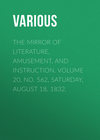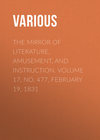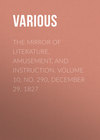Kitobni o'qish: «Chambers's Journal of Popular Literature, Science, and Art, No. 728, December 8, 1877»
THE HIDDEN BOX
A TALE OF THE COVENANTERS
Something like two centuries ago, while the persecution against the Covenanters was raging in Scotland, many were forced, for conscience' sake, to give up all and retire to out-of-the-way places, to be out of the reach of their enemies. Among others, a well-to-do farmer of the name of MacWilliam, reduced to penury by the fines imposed upon him and the confiscation of his lands, withdrew from the home of his youth; and having rented a moorland farm in a remote parish of a neighbouring county, he settled down there with his wife and family. Hillfoot – for such was the name of the farm – lay in a hollow between two hills of moderate elevation, which rose with a gentle slope on each side. A burn ran through the farm, and about two miles farther on, joined a river of some importance. Almost at the confluence of the two the glen took a sharp turn to the left, and thus rendered Hillfoot invisible from the main road, which followed the course of the larger stream.
Though the farm was of considerable extent, little more than a living for the family could be made about it, for heather was more abundant on the hills than grass; and good arable land was out of the question, for the district was so late that cereals could barely ripen, and even the meadows along the holms by the burn-side yielded but scanty crops. It was in this place, however, that James MacWilliam had elected to spend his latter days. All around the house the outlook was no doubt bleak and bare and far from encouraging; but all that he loved most dearly were with him, and if he had not the comfort and luxury of former days, he had what he prized more than all earthly things – freedom to worship God in the way it seemed best to himself. At the time of his removal to Hillfoot he was about forty years of age, and his wife two or three years his junior. They had been married some fifteen years, and two children – a son and daughter – had blessed their union. John, a lad of fourteen, assisted his father in the tending of their flocks and in the working of the farm; while their daughter Barbara, two years younger, helped her mother in the house; and although she was not strong enough yet to do the heavy work, by the sweetness of her temper and the blitheness of her nature her presence enlivened all about her and made the heavy task seem light.
Years rolled on; and though they often heard of the persecution and dreadful punishment their fellow-countrymen, nay even their fellow-parishioners were suffering, still in their remote and unsuspected retreat they were allowed to live on in peace. Ten years had passed, and with them many changes had come over Hillfoot and its inmates. Death had not left it inviolate, for the wife and mother, not strong at best, had been ill able to stand the privations and hardships which the family had endured since settling there. It was with sad hearts that her husband and family saw her pining away; and although they put forth every effort and tried every expedient that love could devise to prolong her life, she sank lower and lower; and when autumn was merging into winter, and the heather-bells were beginning to wither, she passed away. Barbara, on whose shoulders the household duties had long before this fallen, was now no longer a girl, but a comely lass of twenty-two. Her tall graceful figure, kindly manner, and sweet disposition made her beloved by all who knew her, and brought her many admirers. She had become betrothed to a young man, a shepherd on a neighbouring farm, and but for the ailing health and subsequent death of her mother, was to have been married the following summer.
John, on whom, from the decrepitude of his father, the management of the farm had now devolved, had applied himself with so much earnestness to his task, and things had so prospered in his hands, that the family were in a much better condition than they had ever been since their coming there.
Of all the neighbours they had come in contact with, James Morton of Burnfoothill was the one with whom they had the most dealings. Morton's wife had been dead for many years; but his only daughter Janet, a young woman about Barbara's age, kept house for her father. At bottom, Morton was an honourable enough man, but he was grasping and worldly, and cared little for those things which his neighbour MacWilliam regarded as most sacred. Between the old folks accordingly there had been little coming and going; but Barbara and Janet were fast friends, for the two girls had forgathered among the braes shortly after the former had come to Hillfoot, and an intimacy was then formed which grew closer as they grew older, and which now rendered the two almost inseparable.
John MacWilliam had also found something of a kindred spirit in Janet, and from taking a deep interest in her welfare, he gradually awoke to the consciousness of regarding her with a true and honest affection. He had long worshipped at a distance; but now that his mother was dead, and his sister betrothed to a neighbouring swain, he determined to approach the object of his love and tell her the state of his feelings. An opportunity was not long in presenting itself. Janet came on a visit to Hillfoot one lovely June afternoon, and in the evening, as she was preparing to go home, John volunteered to accompany her. They sallied out and wended their way down the burn-side. The sun was sinking behind the hills; the sky was bright and clear and peaceful overhead, and as the shadows lengthened, a dead calm seemed to descend on all things around. Nothing was to be heard save the purling of the brook at their feet, or the bleat of the lambs far up the hillside. The quiet beauty touched the hearts of both as they tripped along, and caused them to linger by the way, that they might the longer gaze on the tranquil scene. Seating themselves on a grassy knowe, with the maiden's hand clasped in his, he told in simple yet passionate language how he had long regarded her with the deepest affection and that she alone could make him happy. Need more be said? They rose to go, for the shadows were deepening; and as they sauntered down the glen hand in hand, it was agreed that he should ask her father's consent that very night.
When they entered Burnfoothill, Morton was much surprised to see John at such an unusual hour; and when he learned his errand, was not overpleased, for he had calculated that his daughter, of whom he was justly proud, would make a better match, since he was rich, and she being his only child, was the heiress-apparent to all his possessions. Accordingly, he would give his consent only on two conditions, and these were, that John should buy Hillfoot and portion it to his daughter! When John heard these conditions, his heart died within him; and he parted that night from Janet like a man in a dream; and, despairing of ever being able to fulfil the conditions, he retraced his steps up the glen with a heavier heart and less elastic step than when an hour or two before he had come down. When he reached home, he knelt by his bedside and prayed to the Father of all mercies for help to enable him to bear up with his trouble.
Throughout the long night he pondered and racked his brain for some expedient whereby he might raise the necessary funds and remove the only obstacle between himself and his happiness, and carry Janet home in triumph – his reward and joy. The day dawned; and as he prepared to go forth to his first duty in the morning, that of looking after the sheep, he felt as if there was no life in him – as if there was nothing to live for now. But the old adage says truly – the darkest hour is just before the dawn. Seizing his staff, he stalked forth and began to ascend the hill. He had hardly reached the top when he saw right in front of him a man looking carefully amongst the heather as if for something he had lost. He appeared to be a stranger to the place; and his dress shewed him to be no shepherd; and John, surprised that such a person should be there at so early an hour, went forward and accosted him. The stranger started when he heard a voice, for he had not noticed any one approaching, but answered cheerily the 'Good-morrow' addressed to him. At first he regarded his interrogator with some suspicion; but the frank open countenance of the latter soon dispelled all doubt; and when John asked whether he had lost anything, the stranger proceeded to tell him the following story.
He began: 'I am a captain in the Scottish army; and the other day while sitting in my house in Edinburgh I received a message to come to the Tolbooth jail, as an old friend desired very particularly to see me. Wondering who this friend in the Tolbooth could be, I set out, and having arrived there you can judge of my surprise when I recognised in the prisoner before me an old comrade and fellow-officer, Bertram by name. We had served together under Leslie, and had been fast friends. After some years, Captain Bertram left his regiment and went up to London. What he went for I could never learn, but I lost sight of him from that time, until he sent for me to come to the Tolbooth. His history he told me had been an eventful one; and he had passed through much since I had seen him last. Amongst other things, he had allied himself with the ringleaders in the Ryehouse Plot; and when that conspiracy had become known to the government, my friend the captain fled with all haste from London and made the best of his way to Scotland. Though he had made many narrow escapes, he got across the Border safe enough, and was congratulating himself on having at last reached a haven of safety, when he learned to his surprise that the limbs of the law were still on his track, and that even there he was not safe. He hurried north as fast as possible, thinking to find refuge in the Highland glens; but his pursuers had been gaining on him, and as he was traversing this part of the country – I take it to be on the top of this very hill – he saw his pursuers, a party of red-coats, come over the top of yonder hill on the other side of the valley. He had carried with him from England a small box of extremely valuable jewellery, by selling which he would have as much as keep him in his old age and forced retirement. But when he saw the soldiers so close on him, he hid the box in a tuft of heather, so that if he were taken it might not fall into the hands of his enemies; and if he did escape he might have an opportunity of coming back and recovering it. He was, however, captured before he reached Glasgow, which I believe is not more than twelve miles from here; thence he was taken to Edinburgh and confined in the Tolbooth, where I saw him. I interested myself in his case, and used all my influence to get him set free; but the evidence of his guilt was too decided to admit of a doubt, and the government was in no forgiving mood. He was tried, condemned, and has been executed. The night before his execution he sent for me and described the place where he had left his box of valuables, and asked me to go and search for them and take the use of them. From the description I got of the hill, I think this must be the one, and my errand here this morning is to find this lost treasure.'
When he had finished his story, John immediately volunteered to help him in his search for the box; and the stranger being nothing loath, the two started to look, and continued the search until the sun had mounted high in the heavens. The stranger, unused to the rough and uneven ground of the hill, was completely knocked up, and determined to give up the search as useless, remarking that it reminded him of looking for a needle in a haystack. After being pressed to go down and partake of some refreshments – which, however, the stranger declined – and as they were on the point of parting, John asked him to leave his address, so that if he did find the box, he would be able to let him know. The stranger did so, and promised a handsome reward if the box was found and brought to Edinburgh. They parted, the stranger to make the best of his way to the village, which lay some four miles off, and thence take horse to Glasgow; John to go his rounds amongst the sheep, which had been neglected while the search was going on.
Whilst he was thus occupied, he kept turning over in his mind what had passed between the stranger and himself, and it suddenly occurred to him that here was an opportunity of raising at least a little money, for should he find the box, the stranger had promised a handsome reward. At the thought, a wild tumultuous joy filled his breast, and he eagerly hastened to finish his round and get back home, so that when he had breakfasted he might renew the search. He was, however, so far behind his usual time of arrival that he found his kinsfolk in consternation at his protracted stay. Fearing some accident had befallen his son, the old man was on the point of going out to seek for him when he made his appearance. John told them the cause of his delay; and also declared his intention of going out to continue the search as soon as he had satisfied his hunger.
The story told by her brother made a great impression on Barbara, and she, after sitting wrapt in thought for a few minutes, exclaimed: 'It must have been him!' Her brother in surprise asked what she meant; and then she told how, one afternoon two or three months before, she had wandered up the burn-side with her seam in her hand, and had seen a man running along the hill as fast as the nature of the ground would permit; and as he ran she saw him halt, and as it were bend down amongst the heather, and then start off to run again. She stood and watched him till he went out of sight, thinking it was perhaps some poor Covenanter chased by 'Kirke's Lambs,' who at that time were the terror of the country; but having watched some time longer, and seeing no one in pursuit, she concluded it would simply be a shepherd on some errand of despatch, and thought no more about it. Her brother's recital, however, had brought the circumstance to her memory; and laying the two things together, she inferred that it must have been Captain Bertram she had seen, and that when she saw him stoop, he had concealed the box of valuables.
When John heard his sister's story, he eagerly questioned her whether she could trace the man's course along the hill or point out the place where she had seen him stoop. Barbara was uncertain, but volunteered to accompany her brother and indicate, so far as she could remember, the spot he was so anxious to find. Hurriedly partaking of the food his sister had prepared for him, in a very few minutes the two issued forth to begin the search. They agreed that it would be better to go to the place where she had been standing when she saw the fugitive, so that she might have a better idea of where to look. They accordingly held their way up the valley, and as they were going he told her all that had passed the night before, and explained how it was that he was so eager to fall in with the concealed treasure. She, with all the ready sympathy of a sister, entered into his spirit; and when they had reached the place where she thought she had been standing, she proposed that he should go up the hill, and in that way she might be more able to tell definitely at what distance the man had been out. The suggestion seemed good, and was immediately carried out; and at the distance of nearly half a mile from where she was standing, she signalled him to stop. She immediately ascended, and as soon as she had reached him the search began in earnest. Sticking his staff in the ground where he had been standing, he hung his plaid upon it; and then Barbara and he going out something like fifty yards, and taking different directions, each described a semicircle with the plaid as centre, meeting on the opposite side. They continued the process, narrowing the circle every round, till they had come within five yards of the plaid; but all to no purpose. The task seemed hopeless, and they were on the point of abandoning the search in the space they had inclosed with the first round, when Barbara, with a joyful cry, drew forth the box from a thick bunch of heather!
The two then hurried home to make known their good fortune to their father, and also to consult how they should let Captain Hamilton, John's friend of the morning, know that they had found the box. There were no telegraph wires in those days which could flash the news to its destination in a few minutes; nor were there even mails from so remote a place, by which letters could be carried with anything like safety or precision. The only way therefore that seemed to be advisable was that John should take the box and carry it all the way to Edinburgh and hand it over to the rightful owner. It was accordingly resolved that he should start very early next morning, which would enable him to reach Edinburgh that day, and take the box with him. To effectually conceal it, Barbara put up two pairs of blankets of her own weaving into a bundle, with the box inside; and when the east was beginning to turn gray, John set out with his bundle on his back, and some cakes and cheese in his pocket. On he trudged with a light step and lighter heart, for he felt he was on the eve of having his dearest wish fulfilled. Long before its inhabitants had begun to stir, he passed through Glasgow, then an insignificant city compared with its present grandeur and prosperity. While it was still early, halting by the wayside he quenched his thirst at a neighbouring spring, and then walked on, passing many villages by the way. By midday he reached Falkirk, and having there done justice to his cakes and cheese, he pushed on; and as the sun was sinking in the west he reached Edinburgh, and with little difficulty sought out the address given him by his friend the captain.
He found that that gentleman lived in one of the most fashionable houses in the town; and when he knocked at the door and asked to see Captain Hamilton, the page told him in a very rough manner that his master had no time to waste on such as he. John felt nettled at this impertinence, but respectfully desired him to tell his master that the shepherd with whom he had been speaking the morning before, was at the door, and wished to see him. The page very reluctantly went; and when he delivered his message, was not a little surprised to see the alacrity with which his master obeyed the summons. The captain took John into his private room, and there eagerly asked him if he had found the box. For an answer, John quietly drew the article asked for from his bundle and handed it to the captain, who took it, and having produced the key which Bertram had given him when he told him the story, opened the box and found the contents all safe. He did not tell John what was the value of the jewels it contained; but after having been made acquainted with the mode in which the treasure had been recovered, he produced a bag containing one thousand guineas, and handed it to the faithful shepherd, as the reward of his honesty and fidelity. He at the same time pressed him to accept of his hospitality for that night; to which John readily consented, being thoroughly worn out by his long and tiresome journey. Ordering meat to be set before his guest, he waited till he had had enough, and then conducted him to a bedroom for the night.



















